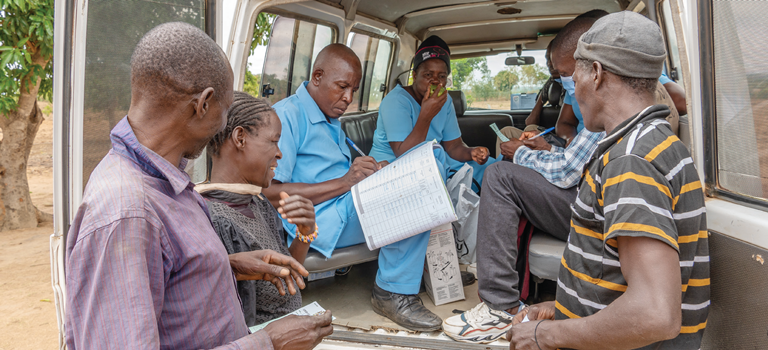Covid jabs on wheels
After burning 19 600 expired Covid-19 vaccine doses in May, Malawi realised in 2021 that putting them closer to people saves lives and jabs.
It is a sunny Tuesday morning in Boyole Village, 25 kilometres north of Kasungu Municipality. The rainy season in the tobacco-growing district is blighted by a prolonged heatwave that makes long walks unbearable, but Egrita Phiri appears undeterred.

The mother of seven is returning from her maize field when she hears a branded van playing hit songs and messages on the importance of Covid-19 vaccination. She promptly waves the vaccination express to stop by her house.
“There is no better time to protect myself,” she says: “With this, I don’t have to endure long travels in scorching sunshine or pay for transport to get vaccinated.”
As community health workers write down her background information in a register and on a green card, more villagers arrive to get vaccinated.
A story of love
Some 15 more people got vaccinated by the time the team deployed by Kasungu District Health Office with support from Unicef Malawi and Kamuzu College of Health Sciences departed for the next stop.
Unicef is also supporting safe storage and distribution of the vaccines the Government of Malawi acquires through the Covax Facility backed by the World Health Organisation.
“I am now vaccinated to protect myself and my family from the current and future Covid-19 waves. Surely, I wouldn’t have been vaccinated if the van had not come close to home,” says Phiri, the wife of group village head (GVH)Vululo.
For her, protecting one another is a love story.
“No one is safe until we all get vaccinated,” she says after getting the first jab of AstraZeneca. She is due for the second in March.
Her husband got the single-dose Johnson & Johnson vaccine in August at Kasungu District Hospital.
The couple first heard of the Covid-19 vaccination in March 2021 when President Lazarus Chakwera publicly got his first shot, kick-starting the nationwide campaign.
“That showed me the vaccine was safe, but it wasn’t easily accessible,” says the woman.
She is alarmed by the Covid-19 related deaths of over 2 000 Malawians, including two ministers.
“Covid-19 doesn’t choose, so my husband did well to protect himself. I have been hearing health workers on the radio saying most of those hospitalised or dying from the virus are those who shun the vaccine. I need to be healthy to take care of my family, crops and the community,” she explains.
Symbol of acceptance
Egrita’s husband, GVH Vululo, is happy that his wife is no longer a symbol of vaccine hesitancy. After three futile trips to Kasungu District Hospital, which cost about K10 000, she received the vaccine on August 23 to protect herself and her community.
He says: “I wish I was vaccinated in my village for my people to learn from me. The vaccine is safe and my wife was motivated because it didn’t kill me. Bringing it closer to those who need it is increasing the number of those getting vaccinated and the understanding that it is safe for everyone.”
The vaccinators also address questions face-to-face, clarifying fears, myths and misconceptions much to the excitement of Vululo, who publicly talks about the benefits of the free vaccines during meetings and funerals.
“Every adult should protect themselves,” he says. “With the express vaccination van, no one bears any financial cost or hardships to get vaccinated. Instead of waiting for us to go to them, the health workers are coming to us. Isn’t that beautiful?” he asks.
The Covid-19 pandemic has pushed Mercy Tchale, one of 16 health surveillance assistants (HSAs) at Dwangwa Health Centre, to the frontline where she now promotes preventive measures and administers vaccines to communities surrounding the rural health facility.
“The pandemic challenges us to embrace innovative ideas to protect our people and the understaffed health sector from being overwhelmed,” she says.
The community health worker assures everyone that Covid-19 vaccines are like any other—a shot at a healthy life in a world struggling with contagious diseases.
She explains: “The number of people who were coming to the health facility to get vaccinated was fewer than 20 a day, but now we are vaccinating over 100 when we go to them.
“This is a no mean achievement. Clearly, people no longer have to stop doing activities that bring food to their homes and travel long district to get vaccinated.”
Head of the Expanded Programme on Immunisation (EPI) in the Ministry of Health Dr Mike Chisema said the 60-day express vaccination campaign has helped ultilise 714 000 doses that were expected to expire in November and December 2021.
Kasungu district EPI coordinator Joseph Chitsime is excited that the mobile teams have helped clear doses that would have expired on December 31.
“Before we rolled out the vaccination express on November 7, we were lucky if 40 people came to get vaccinated. Now our four teams vaccinate 250 to 300 a day,” explains Chitsime. The teams include health promoters who spread accurate messages about the vaccine, HSAs who go door-to-door and stop in strategic places to vaccinate those interested and community leaders who mobilise their people.





